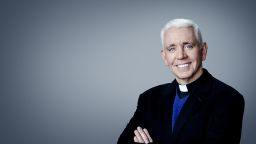Editor’s Note: Father Edward L. Beck, C.P., is a Roman Catholic priest and a religion commentator for CNN. The views expressed in this commentary are his own. View more opinion on CNN.
President Donald Trump announced on Friday that he considers houses of worship and their religious services essential. I won’t argue that point. Although obviously not essential for all, they are deemed so by some. Fair enough.

He went on: “The governors need to do the right thing and allow these very important essential places of faith to open right now, this weekend. If they don’t do it, I will override the governors.”
But who says that religious organizations haven’t already been providing “essential” services without this presidential “blessing?” I am a Roman Catholic priest in the Passionist Community serving, at the moment, in New York. During this pandemic I have buried the dead at cemeteries — with limited family members present. I have prayed with people via FaceTime and Zoom. I even heard a confession in a supermarket parking lot.
Priests with whom I live have blessed the sick and dying in hospitals and nursing homes. We have also celebrated virtual Masses and prayer services for countless of the faithful.
The churches in my area have been open for individual prayer, Benediction services and Stations of the Cross, and social distancing is strongly encouraged. Priests have even paraded in processions in neighborhoods with the Blessed Sacrament in order to bring elements of the church service out to the faithful. Similarly, rabbis and imams whom I know have been doing the equivalent with their respective religious congregations. That is all “religious service.”
What most of us have not done is put ourselves and our parishioners in danger by gathering in large groups for Mass or other religious services “as usual.” That would have been — and would continue to be, in this time of contagion — irresponsible and sinful. It would also violate the right to life of many. Yes, responsible action with regard to religious organizations during this pandemic is a right-to-life issue. This is a right that needs to apply to those who live after birth, too.
In her press briefing Friday at the White House, press secretary Kayleigh McEnany suggested that telling churches not to reopen is a violation of our First Amendment rights.
I don’t see the logic there. No one is prohibiting the free exercise of religion. Though we are in the teeth of a pandemic, in which a very dangerous coronavirus can be transmitted by, among other things, close physical proximity, people can and do continue to worship, albeit in temporarily altered circumstances and in novel ways. To use the “freedom of religion” argument to demand carte blanche the opening of religious venues is to proffer a fallacious argument that can potentially lead to physical harm and, in the worst case, death.
We all want to be able to open churches and places of worship fully so that those who wish to gather in physical communion again can do so. However, this must be done incrementally and with utmost care. Physicians and health experts should be our primary guides here, and religious leaders should follow their guidance with strict and humble adherence.
President Trump wants governors to “allow churches and places of worship to open right now.” That would be foolhardy and dangerous. Most churches and places of worship are not yet ready to fully implement the most recent guidelines from the US Centers for Disease Control and Prevention, which serve only as recommendations. Some congregations, particularly in areas with high infection rates, are not willing to risk reopening even with the new guidelines.
Eventually we will all be ready.
But let us take the time we need to get it right. When those of us who are Christian put out our hands for communion again, let’s be confident that the body of Christ will nourish our bodies and not infect them. Our bodies — and lives — may depend on it.



















